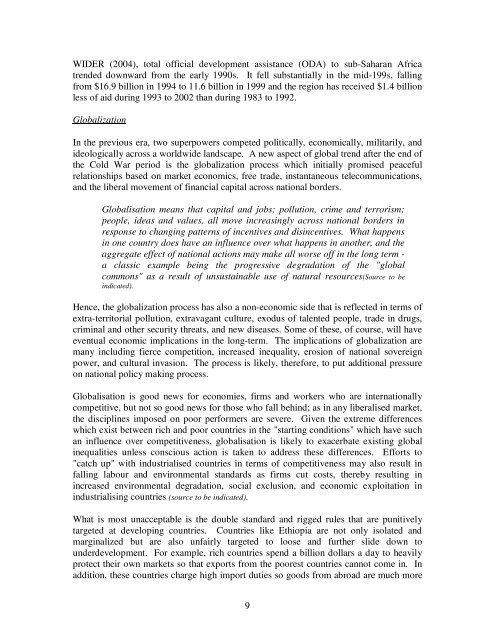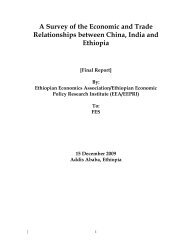external influence in the making of development ... - FES Ethiopia
external influence in the making of development ... - FES Ethiopia
external influence in the making of development ... - FES Ethiopia
You also want an ePaper? Increase the reach of your titles
YUMPU automatically turns print PDFs into web optimized ePapers that Google loves.
WIDER (2004), total <strong>of</strong>ficial <strong>development</strong> assistance (ODA) to sub-Saharan Africa<br />
trended downward from <strong>the</strong> early 1990s. It fell substantially <strong>in</strong> <strong>the</strong> mid-199s, fall<strong>in</strong>g<br />
from $16.9 billion <strong>in</strong> 1994 to 11.6 billion <strong>in</strong> 1999 and <strong>the</strong> region has received $1.4 billion<br />
less <strong>of</strong> aid dur<strong>in</strong>g 1993 to 2002 than dur<strong>in</strong>g 1983 to 1992.<br />
Globalization<br />
In <strong>the</strong> previous era, two superpowers competed politically, economically, militarily, and<br />
ideologically across a worldwide landscape. A new aspect <strong>of</strong> global trend after <strong>the</strong> end <strong>of</strong><br />
<strong>the</strong> Cold War period is <strong>the</strong> globalization process which <strong>in</strong>itially promised peaceful<br />
relationships based on market economics, free trade, <strong>in</strong>stantaneous telecommunications,<br />
and <strong>the</strong> liberal movement <strong>of</strong> f<strong>in</strong>ancial capital across national borders.<br />
Globalisation means that capital and jobs; pollution, crime and terrorism;<br />
people, ideas and values, all move <strong>in</strong>creas<strong>in</strong>gly across national borders <strong>in</strong><br />
response to chang<strong>in</strong>g patterns <strong>of</strong> <strong>in</strong>centives and dis<strong>in</strong>centives. What happens<br />
<strong>in</strong> one country does have an <strong><strong>in</strong>fluence</strong> over what happens <strong>in</strong> ano<strong>the</strong>r, and <strong>the</strong><br />
aggregate effect <strong>of</strong> national actions may make all worse <strong>of</strong>f <strong>in</strong> <strong>the</strong> long term -<br />
a classic example be<strong>in</strong>g <strong>the</strong> progressive degradation <strong>of</strong> <strong>the</strong> "global<br />
commons" as a result <strong>of</strong> unsusta<strong>in</strong>able use <strong>of</strong> natural resources(Source to be<br />
<strong>in</strong>dicated).<br />
Hence, <strong>the</strong> globalization process has also a non-economic side that is reflected <strong>in</strong> terms <strong>of</strong><br />
extra-territorial pollution, extravagant culture, exodus <strong>of</strong> talented people, trade <strong>in</strong> drugs,<br />
crim<strong>in</strong>al and o<strong>the</strong>r security threats, and new diseases. Some <strong>of</strong> <strong>the</strong>se, <strong>of</strong> course, will have<br />
eventual economic implications <strong>in</strong> <strong>the</strong> long-term. The implications <strong>of</strong> globalization are<br />
many <strong>in</strong>clud<strong>in</strong>g fierce competition, <strong>in</strong>creased <strong>in</strong>equality, erosion <strong>of</strong> national sovereign<br />
power, and cultural <strong>in</strong>vasion. The process is likely, <strong>the</strong>refore, to put additional pressure<br />
on national policy mak<strong>in</strong>g process.<br />
Globalisation is good news for economies, firms and workers who are <strong>in</strong>ternationally<br />
competitive, but not so good news for those who fall beh<strong>in</strong>d; as <strong>in</strong> any liberalised market,<br />
<strong>the</strong> discipl<strong>in</strong>es imposed on poor performers are severe. Given <strong>the</strong> extreme differences<br />
which exist between rich and poor countries <strong>in</strong> <strong>the</strong> "start<strong>in</strong>g conditions" which have such<br />
an <strong><strong>in</strong>fluence</strong> over competitiveness, globalisation is likely to exacerbate exist<strong>in</strong>g global<br />
<strong>in</strong>equalities unless conscious action is taken to address <strong>the</strong>se differences. Efforts to<br />
"catch up" with <strong>in</strong>dustrialised countries <strong>in</strong> terms <strong>of</strong> competitiveness may also result <strong>in</strong><br />
fall<strong>in</strong>g labour and environmental standards as firms cut costs, <strong>the</strong>reby result<strong>in</strong>g <strong>in</strong><br />
<strong>in</strong>creased environmental degradation, social exclusion, and economic exploitation <strong>in</strong><br />
<strong>in</strong>dustrialis<strong>in</strong>g countries (source to be <strong>in</strong>dicated).<br />
What is most unacceptable is <strong>the</strong> double standard and rigged rules that are punitively<br />
targeted at develop<strong>in</strong>g countries. Countries like <strong>Ethiopia</strong> are not only isolated and<br />
marg<strong>in</strong>alized but are also unfairly targeted to loose and fur<strong>the</strong>r slide down to<br />
under<strong>development</strong>. For example, rich countries spend a billion dollars a day to heavily<br />
protect <strong>the</strong>ir own markets so that exports from <strong>the</strong> poorest countries cannot come <strong>in</strong>. In<br />
addition, <strong>the</strong>se countries charge high import duties so goods from abroad are much more<br />
9







